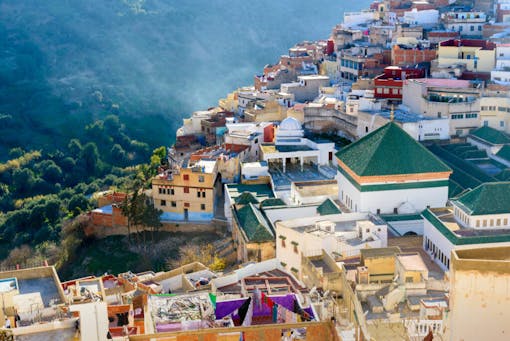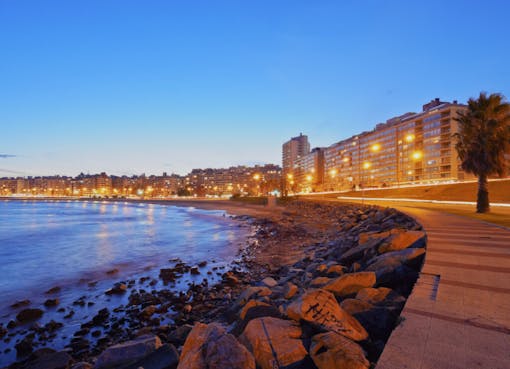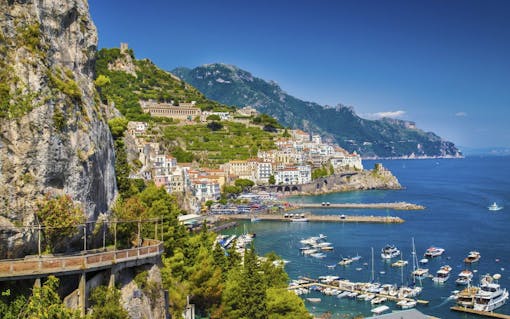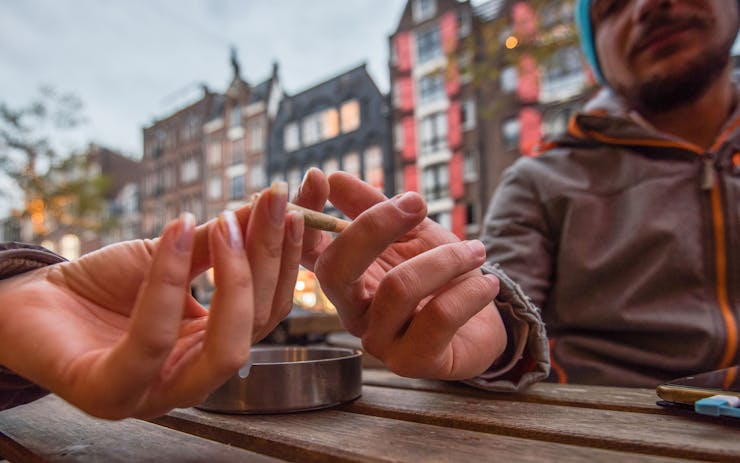With Amsterdam cutting back on cannabis cafes, these countries may soon become must-visits for rolling stoners.
In October 2021, Costa Rica became the most recent in a growing trend of countries moving to legalize access to cannabis. While the Central American nation does not yet permit recreational sale or use, Costa Rica’s Congress did vote in favor of medicinal use.
Costa Rican President Carlos Alvarado still hasn’t approved the new medical law, and it’s still unclear if he will allow it to take effect. President Alvarado was a vocal opponent of the plant leading into last month’s vote, and he’s not the only global official who’s low on cannabis.
Amsterdam has had enough

After decades as the leader of cannabis tourism, the Netherlands’ government is looking to once again reduce the number of coffeeshops in the cannabis hotspot of Amsterdam.
They’re shrinking from 166 to 70 after government research showed 58% of foreign tourists who visit Amsterdam come mainly to consume at cafes.
The goal is to continue serving the local market, but to curb visitors who have coffeeshops at the top of their Dutch travel to-do list.
“The problem is: there are just too many of them,” Amsterdam Mayor Femke Halsema said earlier this year. “The drug tourists are the reason for an increase in demand for marijuana,” which the country’s citizens didn’t sign up for.
With bud booming worldwide, Amsterdam is no longer the only option for 420-friendly travelers. Here are 17 countries that could soon replace Amsterdam as the top tourist destination for traveling tokers.
Canada

Legal to possess? Yes.
Legal to purchase? Yes.
Canada is completely legal, but you’ll need to remember that all 13 provinces and territories have established their own laws.
Before legalization, there were lounges in Vancouver and Toronto that allowed you to enjoy a joint inside, but now in many provinces you can spark up wherever you can smoke a cigarette.
Shop highly rated dispensaries near you
Showing you dispensaries nearRegulations make lounges hard to come by, but select cities do have tours and cannabis-friendly options like HiBnB.
Luxembourg

Legal to possess? Yes, in limited quantities.
Legal to purchase? Only seeds, for now.
Luxembourg is the first European country to legalize, allowing the consumption of personally cultivated cannabis nationwide.
While Luxembourg’s plan to legalize is not geared towards tourism, it will not exclude foreigners from being able to purchase seeds with THC. So far, the commercial rollout of the plan has been delayed by COVID-19. But relaxed penalties make it safe to use without fear of felony charges.
That means you are free to consume before taking in the picturesque country.
South Africa

Legal to possess? Yes, in private.
Legal to purchase? No.
After 92 years of being banned, dagga, the Afrikaans term for the plant, became legal for private adult use and cultivation in 2018. For now, it still remains illegal to sell, buy, or use in public and in front of children.
According to Sibusiso Xaba of the Africa Cannabis Advisory Group, cannabis use is pervasive throughout the country. “There are many illegal dispensaries found throughout the country,” said Xaba. “It’s relatively easy to find cannabis in South Africa. Eastern Cape and Kwazulu Natal are home to famous native strains including the world renowned Durban Poison cultivar.”
The Cannabis For Private Purposes Bill is still being debated and amended in court, but advocates are confident the country will develop a legal market soon.
Morocco

Legal to possess? No.
Legal to purchase? No.
Earlier this year, Morocco’s government approved medicinal and industrial cultivation and exportation of cannabis, but there is still no recreational law.
Morocco is already one of the world’s top exporters of illicit cannabis. Almost a million citizens live in northern communities where cannabis is the main economic engine. In Ketama, located in the northern Rif mountains, the plant has been grown and smoked openly for generations despite prohibition.
Mexico

Legal to possess? Yes.
Legal to purchase? No.
Mexico’s Supreme Court invalidated cannabis prohibition earlier this year, and many of its top politicians continue to push for new regulations that would allow weed to be sold in stores. Even without the ink drying on legalization, you’re still free to smoke in most places now.
Mexico’s weed scene has changed rapidly since possession of small amounts of marijuana was first decriminalized in 2009, and has continued through 2017, when medical was legalized.
With a population of almost 130 million, Mexico could pressure the United States to end federal prohibition before its southern neighbor takes the baton as the worldwide leader in weed.
Uruguay

Legal to possess? Yes.
Legal to purchase? Not for tourists yet.
Uruguay became the first country in the world to legalize in 2013. Now, consumers are permitted to buy up to 40 grams per month from licensed pharmacies for adult use. These purchases are registered and monitored on a government database.
Tourists are clear to smoke if they are given cannabis as a gift, but officials are currently working on a way to allow visitors to purchase from the legal market in an effort to drive tourists away from the country’s illicit sellers.
Portugal

Legal to possess? Kind of.
Legal to purchase? No.
Officially speaking, there are no 420-friendly signs posted in any businesses in Portugal. But it’s well known around the country that a smoking section is intended for smoking hashish.
All drugs have been decriminalized since 2001, but there is no legal cannabis market to shop openly.
Spain
Legal to possess? Yes (in cannabis clubs only).
Legal to purchase? No (see “donation” policy).
In Spain, cannabis clubs have been operating since the 1990s within a legal loophole that allows visitors to donate to the club instead of purchasing a product.
A recent measure to regulate recreational cannabis was not passed in the parliament, but medical regulation is supported by a growing number of Spaniards.
Chile

Legal to possess? Yes.
Legal to purchase? No.
For now, cannabis remains illegal for everyone except medical patients. But legalization advocates hope that change is on its way soon after Chileans voted to overhaul their constitution following protests in 2019 and 2020.
Though medical is legal, advocates say law enforcement still aggressively punishes possession, and affordable treatment is hard to find for patients.
104 of the 155 delegates to the country’s new constitutional convention support decriminalization, which is a very promising sign.
Advocates and the newly empowered native population hope the new constitution will “guarantee health as a right, incorporating all therapeutic alternatives,” including “ancestral, popular, and traditional knowledge of native peoples,” like cannabis.
Ghana

Legal to possess? No.
Legal to purchase? No.
Thanks to passionate advocates, Ghana is a growingly ganja-friendly destination to keep an eye on.
In 2020, the country legalized hemp with less than 0.3% THC for medical and industrial use. But without a license from the Minister of Health, possession is still illegal.
Known as one of Africa’s leading illicit markets, the West African country could soon become a great destination for canna-tourism.
Italy

Legal to possess? Yes.
Legal to purchase? No.
Italy may be on its way to becoming the second country in the EU (after Luxembourg) to fully legalize early next year with a referendum vote. For now, possession of small amounts for recreational or medical use is permitted, but selling or cultivating is forbidden.
Cannabis is an estimated 8-billion-euro industry with six million consumers across Italy. Plans to legalize would tax cannabis at the same rate as cigarettes, adding millions to annual government funds.
Jamaica

Legal to possess? Yes.
Legal to purchase? Yes (with medical card).
From reggae music to Rastafarian culture, Jamaica has influenced the world’s view of cannabis for generations.
In 2015, the plant was finally decriminalized for possession throughout Jamaica. Today, possessing less than 56.6 grams without a prescription will lead to a fine of 500 Jamaican dollars (roughly $5 USD).
Citizens are allowed up to five personal cannabis plants in their homes, and use is permitted for medical, therapeutic, or religious reasons.
If you have a medical card from your doctor at home, Jamaica’s dispensaries and authorities will honor it. If you don’t have one, Jamaica’s Ministry of Health doctors are reportedly liberal about granting medical cards to visitors.
Georgia
Legal to possess? Yes.
Legal to purchase? No.
In 2018, Georgia took a sharp turn from strict prohibition laws when the former Soviet Union territory legalized medical and recreational consumption in 2018.
Smoking in public remains banned, but a visit to Georgia is bound to be a unique experience for tokers traveling through the region.
Greece

Legal to possess? No.
Legal to purchase? No.
In the 1980’s Greece passed laws that punished cannabis possession more harshly than heroin, in a misguided effort to treat heroin addicts as patients instead of criminals.
Greece has come a long way since then, downgrading weed from a Table A to Table B substance and legalizing medical use in 2021.
The government can still prosecute sellers and consumers, but enforcement is rare. If you are caught with a small personal quantity, you can receive up to five months in prison.
As the laws continue to evolve, this could soon be the perfect Mediterranean destination for Mary Jane lovers.
Lesotho
Legal to possess? No.
Legal to purchase? No.
Lesotho was the first African nation to legalize medicinal cannabis production back in 2017.
The country got an EU license to export cannabis flower, oil, and extracts as an active pharmaceutical ingredient. The crop is widely produced in the country, although cannabis possession and use are still illegal.
With cannabis providing a major boost to the country’s economy, it should only be a matter of time before the plant becomes more accessible.
Thailand

Legal to possess? No.
Legal to purchase? No.
Thailand became the first Southeast Asian country to legalize medical marijuana back in 2018. But recreational use remains banned.
The government recently allowed Thai families to grow up to six plants at home, but not for personal use. All flowers and seeds yielded from home grows must be sent to official state medical marijuana facilities, who pay home growers looking to supplement their income.
Weed is still forbidden in most Southeast Asian countries, including some where cannabis crimes are punishable by death.
Fingers crossed, Thailand’s progress could lead to some beautiful views and vibes for traveling smokers in the region shortly.
Pakistan

Legal to possess? No.
Legal to purchase? No.
Pakistan has a long history with cannabis, as does its neighbor, India.
The plant is well-documented in ancient Hindu and Sufi texts. And Sufis still use the the plant for religious worship, aiding in relaxation and openness.
During the 1960s and 1970s, Pakistan’s famous hashish made it an essential stop for travelers on the “Hippie Highway.” That’s why many popular strains can be traced back to this region (Hindu Kush, for example).
America’s War On Drugs pressured the Pakistani government to institute harsh laws and cruel punishment for cannabis use despite the booming illicit markets. Thus, Pakistan joined Singapore, Turkey, South Korea, China, the Philippines, Malaysia, and Japan on Asia’s long list of anti-cannabis nations.
Thankfully, the last decade has seen impressive growth. Pakistani officials hope to soon legalize hemp, and are currently researching the science of the plant.
Hopefully, residents and tourists will soon be permitted by law to enjoy the region’s legendary purple and grey native plants, which are known to grow to incredible heights.





